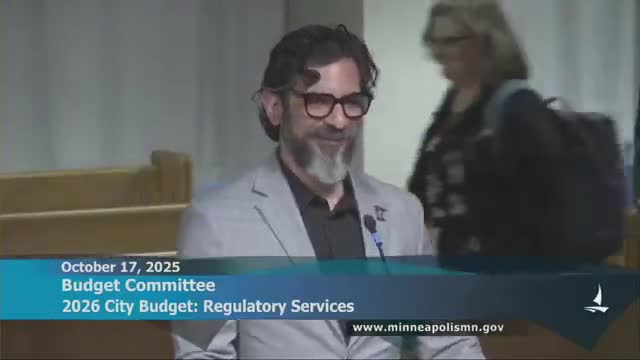Regulatory Services highlights licensing, animal-care capacity and homelessness outreach in 2026 budget presentation
Get AI-powered insights, summaries, and transcripts
Subscribe
Summary
Regulatory Services Director Enrique Velasquez told the Budget Committee on Oct. 17 that the department will realign inspection staff, maintain high live-release rates at Minneapolis Animal Care and Control and continue outreach through the Homeless Response Team while noting recruitment challenges and some proposed reductions.
Regulatory Services Director Enrique Velasquez presented the department’s 2026 supplemental budget recommendation to the Budget Committee on Oct. 17 and outlined operational changes, staffing constraints and program outcomes across inspections, animal care, traffic control and the homeless response team.
Velasquez said, “Our mission is to protect the health, safety, and welfare of residents, visitors, and pets through enforcement, education, and community engagement,” and described a department reorganization that moves two housing-focused teams into inspection services to better align field work.
Why it matters: Regulatory Services enforces rental licensing and inspections, operates Minneapolis Animal Care and Control (MAC), manages traffic-control and parking enforcement, and runs the Homeless Response Team (HRT). Shifts in staffing, contract availability and program design affect shelter-animal capacity, nuisance responses and frontline homelessness outreach.
Major points from the presentation
- Reorganization and staffing: Velasquez described a reorganization that moves the alternative enforcement team and the housing liaison team into inspection services. The net budgetary effect is neutral for the department, he said, but the change shifts where staff report. Overall the department reported a number of vacancies and noted the department is “stretched beyond capacity.”
- Minneapolis Animal Care and Control (MAC): Velasquez highlighted a live-release rate above 90% and said MAC has had more than 656 pet surrenders in 2025 to date. The shelter depends on nearly 4,500 volunteers and about 489 foster families; Velasquez said Mac’s grant-funded foster coordinator position will expire at the end of the year. An audit prompted an interim request for a security specialist: Velasquez said the mayor’s budget includes a one-time $101,000 allocation to pay for a MAC security specialist while the city addresses audit findings about on-site security risks.
- Inspection services and prolonged vacancy enforcement: Inspection services now licenses and inspects Minneapolis Public Housing Authority properties for the first time, Velasquez said. The division also used tenant remedies actions (TRA) to bring 22 properties into compliance and reported 28 additional TRA cases in progress. The department described an early result from a newly implemented Prolonged Vacancy Enforcement ordinance: 59 properties entered the PVE program, and about 20 are actively moving toward sale or rehabilitation.
- Homeless Response Team (HRT): Velasquez said the HRT has provided 276 housing referrals so far this year. The department proposed eliminating funding for one vacant homeless response coordinator position after repeated unsuccessful recruitments; the HRT will continue outreach with its existing staff. Velasquez said the city lacked a viable pool of contractors for hand-washing stations, portable toilets and storage services; after two procurement efforts the department received insufficient bids and is not funding storage/handwashing/portable toilets in the proposed budget for 2026.
- Traffic control and special events: The presentation said traffic control was fully staffed in 2025 and responded to nearly 100% of calls within its service-level agreement; staff also supported an increase in special events. Director Ahmed Bridal (Traffic Control) explained traffic-control agents handle many venue-based and regular special-event traffic duties and that MPD leads on security-heavy events where police coordination is required.
Committee discussion and follow-ups
- Staffing and hiring: Committee members asked about vacancies and hiring timelines. Velasquez and division directors said some roles have active recruitments (for example, inspection services supervisors) and that certain traffic-control backfills are in process. Velasquez said four of the department’s vacancies are in traffic control, with other vacancies in inspection and homeless-response roles.
- Homelessness metrics and outcomes: Council members asked how many of the 276 HRT housing referrals resulted in a successful placement; Velasquez replied the department and county partners do not currently track whether each referral resulted in housing, and he said the city is seeking better data-sharing with Hennepin County to measure outcomes.
- Contracts for unsheltered supports: Velasquez described two unsuccessful procurement rounds for storage, handwashing and portable toilets; only one respondent expressed partial interest and did not meet the requirements. Velasquez said the downtown council proposed an alternate approach for services they already support, but the city’s bid requirements did not align with available vendor capacity.
No formal votes were recorded during the presentation. Velasquez closed by asking the committee to note continuing risks related to staffing capacity, shelter-animal foster-coordinator funding lapsing at year-end, and the need for interagency coordination on homelessness response.
